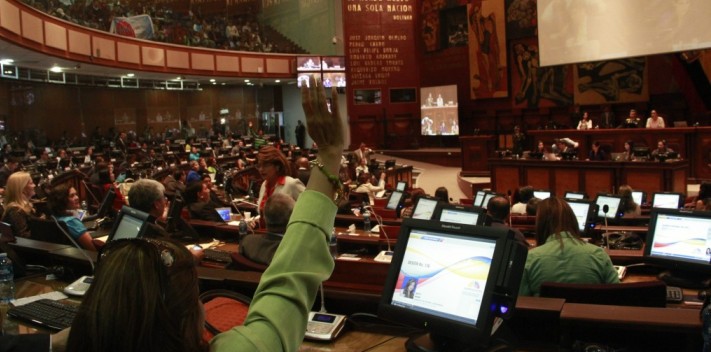
EspañolAs Quito citizens celebrated the 481st anniversary of their city’s foundation on December 6, the National Assembly was getting ready to pass a series of constitutional reforms behind the people’s backs. One hundred congressmen belonging to the ruling PAIS Alliance voted for legal measures that will further concentrate power in President Rafael Correa’s hands.
While many Quito residents played Cuarenta (the country’s national card game) and drank canelazos (a traditional beverage), the Assembly members strengthened the “leader of the masses” and gave the president greater power to impose a socialist economy on the citizens.
Three days earlier, in the early morning of Thursday, December 3, the military had placed barbed wire around the National Assembly building, where soldiers were on guard. Government sympathizers arrived en masse as well. They feared a reaction from those citizens who are aware that the constitutional changes are a true danger to freedom.
[adrotate group=”7″]
And government forces had good grounds to fear revolt. The approved constitutional reforms have officially made communications a “public service.” In practice, this means that the government will oversee every type of media. A measure of this type would be unthinkable in any true democracy. Ecuador’s highhanded government, on the other hand, has in effect turned the media into its own echo chamber.
These constitutional changes will effectively put an end to Ecuador’s freedom of the press, which has already been shackled under Correa’s government. The Ministry of Communications (Secom) has sanctioned Twitter users, journalists, and media outlets that don’t share the government’s viewpoint.
The constitutional amendments also include indefinite and consecutive reelection for the president. This threatens the republican character of the political regime. Presidential power is already excessive. Institutional checks on the head of state are deficient. The government uses public funds to run a permanent campaign.
As in the case of other Latin American countries with authoritarian governments, indefinite reelection will continue to weaken Ecuadorians’ individual rights and liberties, as citizens will come further under the yoke of the ruling caudillo.
According to Ernest Laclau, the late post-Marxist philosopher, Latin America’s progress required the concentration of power in the hands of individual leaders. In Ecuador, things are running according to plan. The government’s pincer movements against democracy are part of a coherent strategy within 21st-century socialism.
Extracts from the debate among Ecuadorian Assembly members confirms this. One congressman argued that, “since 2007, Ecuador has undergone a profound process of social, economic, and political transformation, both internally and externally. We have not only left behind the merciless practice of distributing wealth among the usual minority. We have also recreated a government of the people and for the people, respecting all its facets. We respect the communities for their decency and dignity. We allow the government to improve their living conditions. We move forward with a new way of citizenship coexistence, diversity, and harmony with nature, to reach the good life: the sumak kawsay.”
This unveils the amendment’s servile nature. Don’t be fooled: the changes to Ecuador’s Constitution have nothing to do with progress, harmony, or diversity. They aim solely to maintain Rafael Correa and his party in power.
 Versión Español
Versión Español












